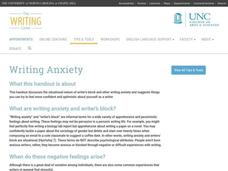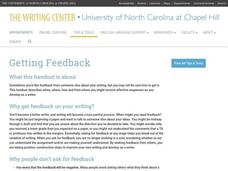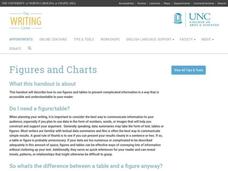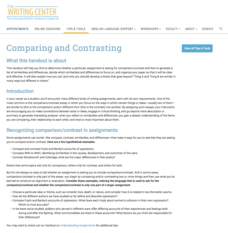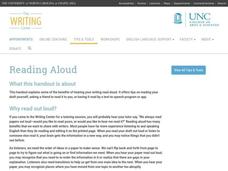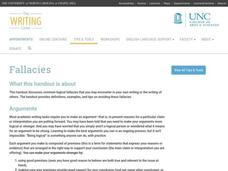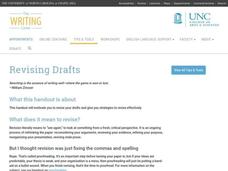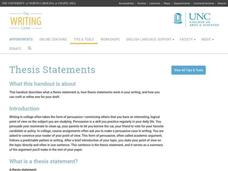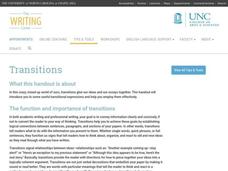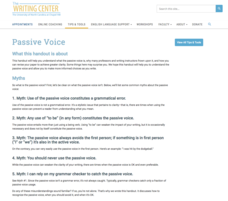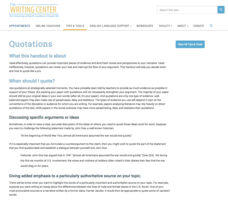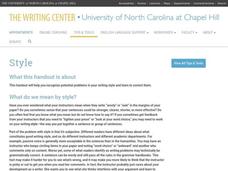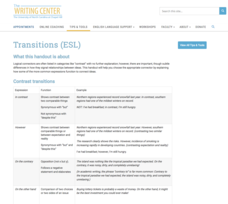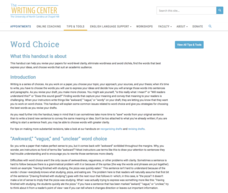Poetry4kids
Five Ways to Overcome Writer’s Block
Every writer knows how terrible writer's block can feel. Use these five writer's block-busting techniques to help young writers get out of their rut and into a better state of mind.
University of North Carolina
Writing Anxiety
Oh, the dreaded writer's block! As part of a larger paper-writing series, an invaluable resource discusses obstacles and stresses writers face. Individuals learn to identify feelings associated with anxiety, as well as strategies for...
University of North Carolina
Getting Feedback
As many writers know, you are your own worst editor. The 10th installment in the Writing the Paper series explains that getting feedback from others is crucial to the writing process. The handout highlights the best time to ask others to...
University of North Carolina
Figures and Charts
Sometimes words aren't the best way to get information across to the reader. The eighth handout in the 24-part Writing the Paper series describes different type of figures and charts to display complex information in a paper....
University of North Carolina
Comparing and Contrasting
Not all compare and contrast assignments have writers compare and contrast in the same way. Some only ask for comparisons, others only ask for contrasts, and many require more focus than a simple list of similarities and differences....
University of North Carolina
Qualifiers
A lot of writers really struggle very much with adding a lot of qualifiers and intensifiers in their writing. Part of a larger series to improve writing skills, a handout on the topic provides tips to help reduce a reliance on these...
University of North Carolina
Reading Aloud
Warning: reading your paper aloud may cause bystanders to think you're talking to yourself. However, as the 14th installment of 24 in the Writing the Paper series from UNC explains, it is one of the best strategies for revision. Through...
University of North Carolina
Gender-Inclusive Language
In the past, if writers weren't sure of a person's gender, they simply used masculine pronouns. Today, however, as a handout on gender-inclusive language explains, writers must choose pronouns carefully. To promote the use of gender...
University of North Carolina
Evidence
You can claim that soda rots people's teeth or that dinosaurs were actually birds, but your claim will not stand up if it is not backed by evidence. A handout from UNC Writing Center, the seventh in the Writing the Paper series of 24,...
University of North Carolina
Fallacies
All teacher workrooms contain a coffee maker, therefore all teachers must be addicted to coffee. That sentence represents a logical fallacy (although it may be true from some), a topic the seventh installment in the 24-part Writing the...
University of North Carolina
Revising Drafts
Don't simply proofread ... revise instead! Revising drafts is the topic of the 17th handout in UNC's Writing the Paper series of 24 lessons. Writers discover the importance of revision, as well as steps to follow during the process.
University of North Carolina
Summary: Using it Wisely
Sometimes summarizing keeps a writer from going deeper into their analysis—don't fall into that trap. Learn the difference between summarizing and analyzing using an insightful resource. Focusing on introductions, the lesson shares...
University of North Carolina
Thesis Statements
Phrases such as "This paper is going to be about" and "I am going to tell you about" do not make for effective thesis statements. A handout from the UNC Writing Center helps writers break from those phrases to craft effective thesis...
University of North Carolina
Transitions
Ideas don't naturally flow from one to another. They need transitions to help them connect. Part of a larger Writing the Paper series, the resource introduces writers to the concept of using transitions in their writing. Topics covered...
University of North Carolina
Clichés
When it comes to writing, cliches are as old as dirt. A handout on tired phrases provides examples of cliches, as well as a description of the negative effects they have on a paper. Writers discover specific words and phrases to avoid,...
University of North Carolina
Conciseness
Twitter has helped people learn to express their ideas in as few words as possible, but away from the 280-character limit, writers still struggle with keeping their writing short and to the point. Conciseness is the focus of a writing...
University of North Carolina
Passive Voice
Why was the road crossed by the chicken? Because the writer forgot to write in active voice. Many myths surround the use of passive voice. Thankfully, an informative handout explains how to recognize passive voice and when it's okay to...
University of North Carolina
Plagiarism
As many unfortunate journalists have learned, taking someone else's ideas and passing them off as your own is never a good idea. It's called plagiarism—and it's a big deal. Thankfully, a handout helps writers learn how to avoid...
University of North Carolina
Quotations
According to A.A. Milne, "[A] quotation is a handy thing to have about, saving one the trouble of thinking for oneself." However, as part of a larger series of handouts discusses, quotations also have the ability to enhance a piece of...
University of North Carolina
Style
Just like you choose your clothes to ensure they fit the occasion, you should choose your words deliberately while writing. Style, the main topic of one handout in a series on writing skills, involves choosing words carefully and paying...
University of North Carolina
Transitions (ESL)
When it comes to comparing and contrasting in an essay, looking at a chart and picking a random transition word may not do the trick. As explained in an informational writing handout, the words writers use to move from one idea to...
University of North Carolina
Word Choice
Words matter, particularly in academic writing. Issues such as vague language, wordiness, and cliches make it difficult to get a point across. Part of a larger series to improve writing skills, the handout on word choice shows writers...
University of North Carolina
Argument
What elements make up a successful argument? A helpful resource describes aspects of an argument such as the claim, evidence, counterargument, and audience. Perfect as an individual assignment for a flipped lesson or collaborative work,...
University of North Carolina
Abstracts
Some of the best information to include when writing a research paper doesn't come from books, magazine articles, or informational websites—it comes from dissertations. However, reading an entire dissertation is often a daunting task....
Other popular searches
- Freedom Writers
- Writers Workshop
- Writers Notebook
- Writers Craft
- Freedom Writers Movie
- Writers Craft Story Starters
- Natural History Writers
- Writer's Workshop
- Writers Block
- Freedom Writers Diary
- Women Writers
- Beat Writers

